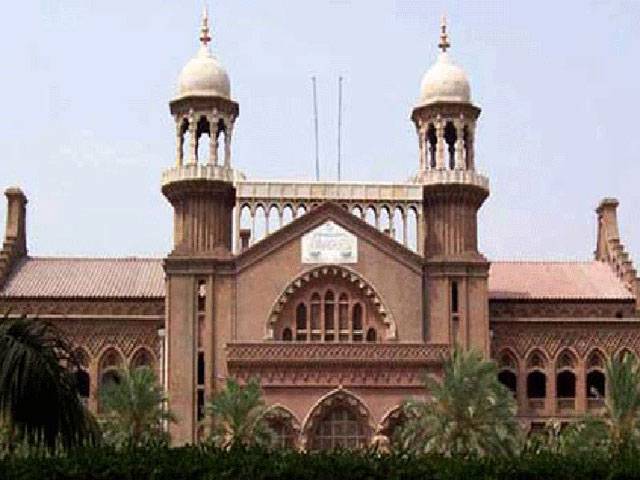LAHORE - A division bench of the Lahore High Court (LHC) on Monday upheld the decision of a single bench, which had declared relocation of three sugar mills owned by the Sharif family from central Punjab to southern Punjab illegal.
The bench was headed by LHC Chief Justice Syed Mansoor Ali Shah. Justice Shujaat Ali Khan was member of the bench, which passed the order on intra court appeals moved by various appellants, including close relatives of Sharifs.
In a 38-page detailed judgement, the bench held “impugned judgement dated 10.10.2016 of the learned Single Judge is upheld and it is declared that shifting/relocation of the aforesaid three sugar mills, from central Punjab to southern Punjab, is in violation of the Ordinance, as well as, the ban notification, hence establishment of the three sugar mills is declared illegal and without lawful authority”.
The bench ruled that “Relocation Notification” issued by the provincial government on Dec 4, 2016 was declared ultra vires The Punjab Industries (Control on Establishment and Enlargement) Ordinance, 1963, and was therefore set aside.
Close relatives of Sharifs shifted had relocated three sugar mills – Haseeb Waqas Sugar Mills, Ittefaq Sugar Mills and Chaudhary Sugar Mills — from areas of central Punjab to southern Punjab. Haseeb Waqas Sugar Mills was shifted/relocated from Nankana Sahib to Muzaffargarh, Ittefaq Sugar Mills from Sahiwal to Bahawalpur and Chaudhary Sugar Mills from Toba Tek Singh to Rahim Yar Khan.
The bench ordered three sugar mills to restore and restitute their position as they stood when the first restraining order was issued in their case, respectively. The court said these mills should be dismantled and removed from their present locations within a period of three months from Monday (the day when the decision on these appeals was announced).
The judgement held that “commencement and setting up of three sugar mills in southern Punjab, without Environmental Impact Assessment under the Punjab Environmental Protection Act, 1997, also renders the establishment of the three sugar mills illegal”. The appellant mills, however, have the right to appeal but it is still not clear whether they will challenge the decision or not.
On Oct 10, 2016, Justice Ayesha A. Malik, while deciding a petition moved by Jahangir Khan Tareen, had set aside relocation of these three sugar mills from central Punjab to southern Punjab. She had ruled, “Three sugar mills have been set up without obtaining permission under the Ordinance and in violation of the explicit court orders restraining establishment of the sugar mills in southern Punjab. Relocation notification is in violation of the scheme of the Ordinance, as there is no difference between relocation and establishment of a new sugar mill in the area.”
However, three sugar mills, through their intra court appeals, challenged the verdict and submitted that the ban notification did not cover relocation of an existing sugar mill; therefore, relocation of the three sugar mills was not illegal. They said that as relocation was not subject matter of the Ordinance, no permission was required to be sought from the government under Section 3 of the Ordinance. The appellants said that during shifting of the mills, Relocation Notification was issued, permitting the appellants to relocate their mills within Punjab. The appellant, however, could not seek permission under the Relocation Notification because the same was suspended by the court.
Advocate Khawaja Haris Ahmad represented the provincial government and said the relocation notification framed by the government was a bona fide exercise, as it catered to economic exigencies of the time and was geared towards alleviating the faltering financial condition of the sugar mills in central Punjab. He said a detailed exercise took place and reports were sought from all relevant departments. After a thorough environmental and ecological survey of the area, he said, the relocation notification was framed. He said the relocation notification confirmed that there shall remain a ban on setting up new sugar mills but relocation of existing sugar mills and that too after compliance with strict conditions should be permitted. Therefore, he said, there is no mala fide on part of the government in promulgating the relocation notification.
He argued that the ban on the new sugar mills should be upheld; it had no bearing on the relocation notification as it did not deal with establishment of new sugar mills but was confined to relocation of the existing sugar mills. Relocation notification is not inconsistent with the ban but creates an exception in the public interest for the ailing sugar mills of central Punjab facing acute economic and operational problems, he argued. He contended that it was for this reason that the Punjab government supported the ban on establishment of new sugar mills and did not discuss or raise the concept of relocation before the Supreme Court in the cases of Tariq Khan Mazari and three others. His main contention was that relocation notification was not tainted with mala fide but was rather a bona fide effort of the government to address the acute economic, financial and operational problems faced by the sugar mills located in central Punjab.
Aitzaz Ahsan, counsel for the JWD Sugar Mills of Jahangir Khan Tareen, however opposed their arguments, saying that the relocation notification itself was tainted with mala fide as it was conceived to give a legal cover to three sugar mills, which belonged to Sharifs and their cousins. He said that these sugar mills repeatedly violated court orders and continued their establishment. He prayed to the court to declare establishment of these three sugar mills illegal.






